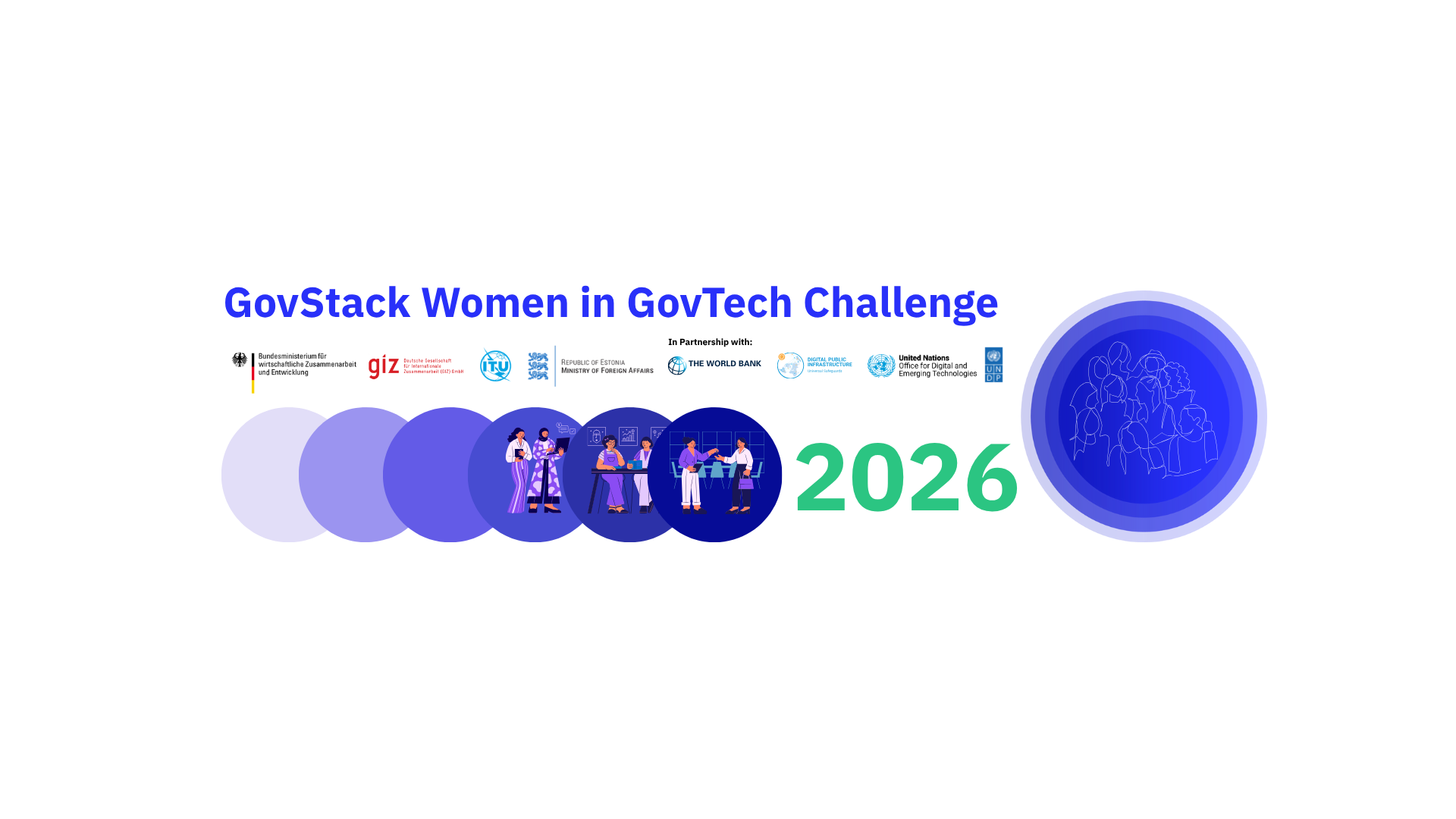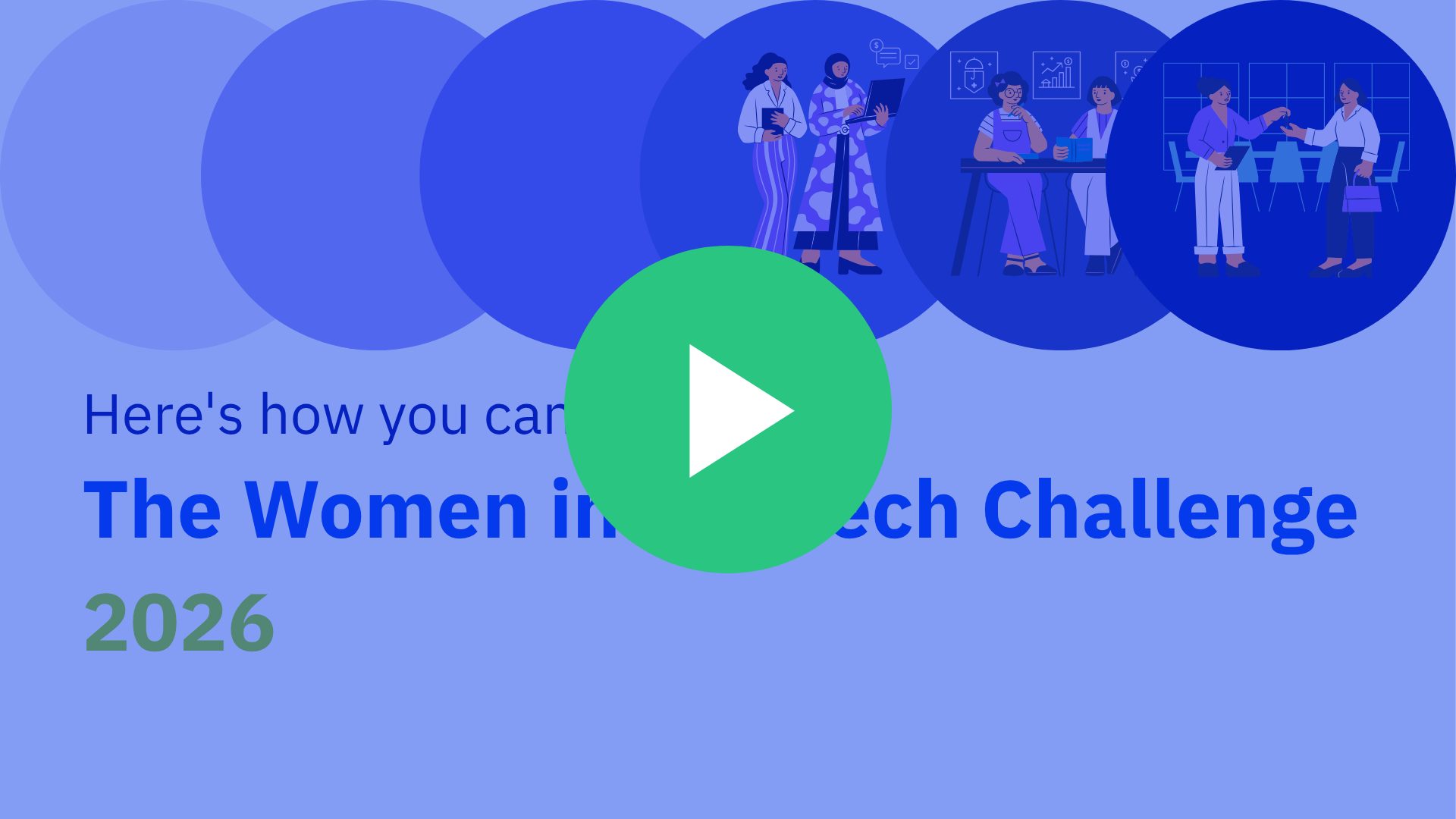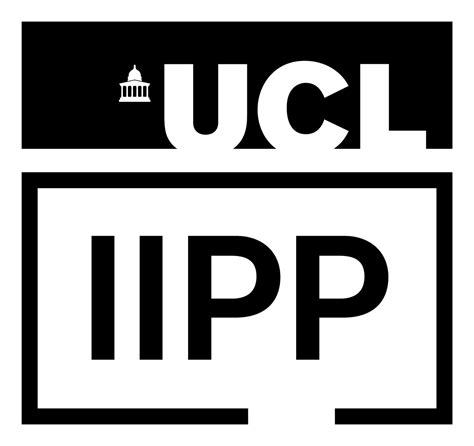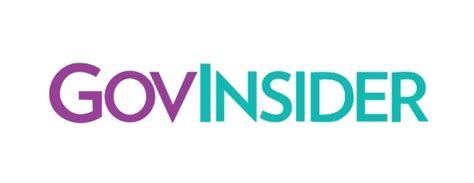Bridging the Gap through Mentorship: GovStack Women Shaping the Future of Digital Services
Women remain significantly underrepresented in GovTech, despite the global commitment to gender equality in digital transformation as part of the Sustainable Development Goals (SDGs).
The GovStack Women in GovTech Challenge 2026 directly contributes to this goal by empowering women to design and develop safe, inclusive, and citizen-centric digital government services while fostering a strong international network of women leaders in GovTech.
Building on the success of the inaugural edition in 2024 and the second cohort of 2025, we have now brought together an alumni community of 308 women from 50 countries. The Women in GovTech Challenge returns in 2026 — with a broader scope, hands-on implementation pathways, and even more partners.
In the third edition, we are excited to once again partner with the World Bank and the DPI Safeguards Initiative , stewarded by the UN Office for Digital and Emerging Technologies (UN ODET) and the UNDP, and to welcome our new partners: University College London (UCL) as academic partner, and the Open Source Ecosystem Enabler (OSEE) initiative.
This transformative programme enhances participants’ technical expertise and leadership skills, equipping them to shape the future of digital governance. The third cohort builds on the success of the previous two editions with a new, ambitious goal: to move beyond training and wireframing towards prototyping and moving a step closer to real-world implementation pathways.
This year’s challenge expands its scope to provide a complete, hands-on experience in creating citizen-centric digital government services. The challenge aims to bridge the gap between design and technical implementation, empowering multidisciplinary teams of women to become leaders in digital government transformation.
This year, Participants alongside learning the GovStack open-source inclusive approach to digital service design keeping in mind the DPI Safeguards principles will also have the opportunity to pitch their prototypes to ecosystem partners. Teams will have the chance to pick working on current ongoing implementations or decide their own use case in teams.
What to Expect?
From Learning to Prototyping and potentially exploring Implementation
The third cohort of the Women in GovTech Challenge bridges the gap between design and delivery, giving participants a truly hands-on experience in digital transformation.
The programme empowers women to move from ideas to prototypes and closer to real-world implementation, equipping them with the technical expertise, leadership skills, and global networks to drive citizen-centric digital government.
It aims to:
- Build leadership and facilitation capacity among mentors.
- Develop implementation-ready digital solutions that respond to real, partner-defined challenges.
- Strengthen a global network of women practitioners advancing digital government.
- Showcase prototypes at Demo Day and explore pathways for in-country pilots.
- Participants will also gain:
Technical Skills — Learn the GovStack Building Block approach to designing digital services; apply the DPI Safeguards Framework to embed safety, equity, and inclusion from the outset; and manage agile teams to create interoperable, scalable solutions.
Soft Skills — Strengthen communication, collaboration, and critical thinking to navigate complex projects and diverse, multidisciplinary teams.
Career Development — Build leadership, decision-making, and people-management capabilities to expand career opportunities in GovTech.
Networking Opportunities — Connect with leading voices in the ecosystem, and join an international cohort of women shaping the future of digital public infrastructure.
Applications are now closed
thank you for your interest in the Women in GovTech Challenge 2026
Here's how you join!
Criteria for joining as a mentee, team, or mentor
Criteria for Mentees
- Who can apply: Women working in Government, Private Sector, Civil society, or Academia in roles such as, but not limited to:
- Project Coordinator
- Service Designer
- Policy/Legal Advisor
- User Research Specialist
- Solution Architect
- Developer/Technical Specialist
- Demonstrate Interest or Experience in GovTech: Show interest in GovTech or prior experience in digital transformation initiatives.
- Be Comfortable in English: The programme will be conducted in English.
- Time Commitment:
- 1.5 hours per week for mandatory lecture sessions.
- 1 hour for Networking Sessions (three weeks out of six).
- Optional Office Hours: 2 sessions per week, 1 hour each.
- 2 hours per week for assignments and group work.
Criteria for Mentors
- Criteria for Mentors
- Who can apply: Senior women leaders in GovTech from Government, Private Sector, or Academia.
- Be Comfortable in English: The programme will be conducted in English.
- Stable Internet Access: Ensure reliable connectivity for mentor sessions.
- Time Commitment:
- 2 hours per week to mentor participants and provide guidance and feedback during the programme.
Criteria for Group Mentees
- Who can apply: Team of 2-6 women working in Government, Private Sector, Civil society, or Academia in roles such as, but not limited to:
- Project Coordinator
- Service Designer
- Policy/Legal Advisor
- User Research Specialist
- Solution Architect
- Developer/Technical Specialist
- If you are applying as a team of six women, try to maintain a balanced mix of technical and policy expertise.
- Demonstrate Interest or Experience in GovTech: Show interest in GovTech or prior experience in digital transformation initiatives.
- Be Comfortable in English: The programme will be conducted in English.
- Time Commitment:
- 1.5 hours per week for mandatory lecture sessions.
- 1 hour for Networking Sessions (three weeks out of six).
- Optional Office Hours: 2 sessions per week, 1 hour each.
- 2 hours per week for assignments and group work.
Timeline of the Challenge






Code of Conduct
Please click the button below to access the Code of Conduct for the challenge.
FAQ
Is the training programme certified?
Yes, participants who complete all requirements of the Challenge will receive a Certification of Completion. There will also be a Certificate of Participation awarded to all participants.
Are there any eligibility requirements related to academic qualifications? (For example, being an engineer or having an IT background.)
There are no eligibility requirements related to academic qualifications; the challenge is open to women from all backgrounds working in but not limited to Government, Civil society, Academia, Private Sector. We intend to provide technical training through the course of the Challenge via our Lectures and e-learning courses. There will also be mentors and technical experts to assist teams, so we encourage all women to apply!
The lecture session is 1 hour 30 minutes per week. Will it be a live webinar that participants need to join at a specific time (if so, what time and date?), or will it be available on-demand at the participant’s convenience?
For mentees, the time commitment per week of the Challenge is attending a live Lecture session for 1.5 hours, optionally attending virtual office hours in case of questions and we estimate the course burden to be 2.5 hours per week for completing the assignments and group work. For mentors, we estimate 2 hours of work per week which includes them mentoring their teams via a self-organised team call by their mentees and answering questions from their mentees, mentors do not have to complete any assignments and are open to attend the live lecture sessions if their schedule allows. The lectures will also be recorded and uploaded on the e-learning portal where we will run this course and participants will have access to- Atingi.
The eligibility criteria seem to be linked to holding a leadership position related to e-Government or IT. Could you confirm this?
The eligibility criteria for Mentors and Mentees are separate. For Mentors, we encourage senior women professionals in GovTech to apply as they would be co-mentoring a group of mentees, young/ mid-career professionals. For Mentees, we invite applications from all women working in but not limited to Government, Civil society, Academia, Private Sector.
What is the level of participation expected from mentees?
We intend to conduct the 1.5-hour live virtual lecture sessions on Wednesday from 15 to 16:30 CET. This might be subject to change, but we will inform participants of the Challenge well in advance. All mentees will be required to complete individual assessments and as a group, submit weekly assignments on the e-learning course on Atingi. The group will also be required to present their work during pitch sessions. Please note: The lectures are recorded in case a mentee cannot attend due to an emergency. Further, mentors are not obligated to attend lectures unless they wish to do so.
Are the lecture sessions and the office hours recorded?
Yes, the lecture sessions and office hours will be recorded and uploaded to the e-learning course of the Challenge on Atingi.
Is it mandatory for all mentees to attend all lectures sessions?
All mentees are encouraged to attend at least 3 lecture sessions out of 6 lecture sessions.
Can master’s students participate in this programme?
Yes, master’s students are welcome to apply as mentees or mentors if they meet the programme’s eligibility criteria.
Can business development or saleswomen join? Can women from the private sector participate?
Women working in but not limited to Government, Civil society, Academia, Private Sector can apply if their work aligns with GovTech or public service innovation.
What is the difference between individual mentees and groups? Which has the best acceptance chance?
- Individual mentees apply alone and will work on their learning journey in a group curated by the organisers based on answers in the form.
- Group mentees (teams of 2-6 people) apply together, usually from the same organisation or project, and work collaboratively on assignments. Each group will have a total of six mentees. If your group has fewer than six members, additional participants will be assigned to complete it.
Both application types are equally considered, and the acceptance decision is based on eligibility, motivation, and alignment with programme goals.
How will you select Mentors?
Mentors are selected based on expertise in GovTech, digital transformation, leadership, and public service innovation. Selection criteria include:
- Relevant professional experience in GovTech, digital governance, or public digital infrastructure
- Motivation and commitment to supporting mentees throughout the programme.
Can I make an application as both a mentor and mentee?
Yes, please feel free to make your application as both. The outcome of your selection as a mentor or mentee will not be affected by your double application. We will evaluate your application based on your suitabiity for the role.
Should the Mentee have tech skills to apply?
No, tech skills are not a requirement. The programme is designed to support women from various backgrounds, including but not limited to policy, governance, and service design, alongside technical fields.
Is there any coding skill required?
No, coding skills are not required. While some technical topics may be covered, the focus is on digital government transformation, leadership, and innovation, making it accessible to participants from both technical and non-technical backgrounds.
What are mentees expected to present during the demo week?
During the course of the challenge, you will have the chance to select a use case and develop in your groups prototypes that will be presented. The organisation team will provide you with guidelines for the demo in advance of the demo week. Mentees and mentors will have opportunities to showcase their work and contributions during and after the programme.
Will there be any further engagements after the 6-week challenge?
After the 6-week Challenge, you will have 1 week to prepare your pitch and there will be Alumni engagement opportunities, including
- Joining the GovStack Slack Channel which consists of a robust global network of, for example, experts, supporters and past participants from other trainings
- Joining the GovStack ALumni channels which consists of the alumni of the first two cohorts of the WiGTC and Ambassadors.
- Speaking opportunities in GovStack and partner-led events on the Challenge



